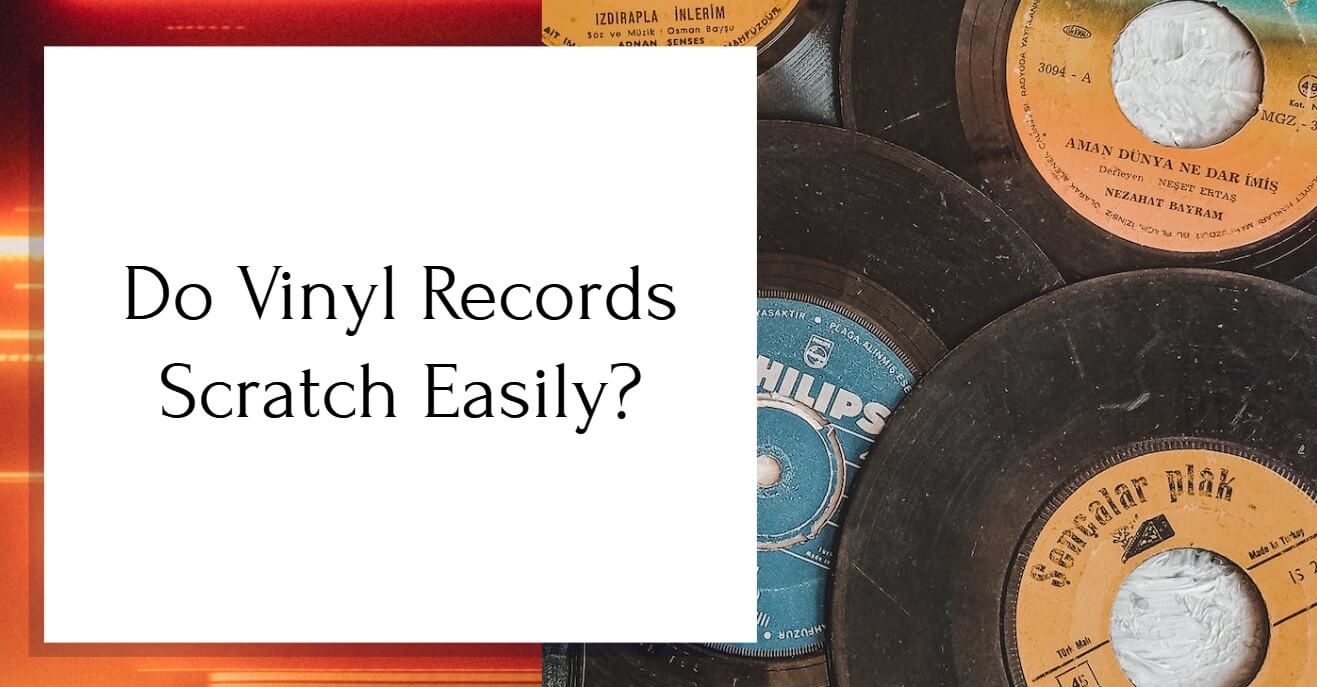How relaxing is it, getting home after a long day of work, playing your favorite vinyl record while sitting on your favorite chair, and kicking up your feet? However, just when you’re about to put the delicate vinyl record back in its sleeve, it falls to the floor.
You think to yourself, “it’s ok. It’s not that bad of a fall,” or is it? Do vinyl records scratch easily? Keep reading to know more about it.
Do Vinyl Records Scratch Easily?
Yes, vinyl records usually scratch easily. Those things are fragile and prone to damage. So, you should be careful when handling them.
How Do Vinyl Records Scratch?
There are several situations where your vinyl records might get scratched. Those situations include but are not limited to:
- Placing vinyl records on different surfaces without their cover.
- Removing the vinyl record while it’s still spinning.
- Cueing the vinyl record without using the cueing lever.
- Piling up vinyl records on top of each other, even if they’re inside their sleeves.
- Handling vinyl records carelessly when removing or placing them inside their sleeves.
How To Avoid Scratching Vinyl Records?
Mainly, to avoid scratching vinyl records, you’ll have to learn how to handle them. Most of the reasons vinyl records get scratched can easily be prevented. Here are some tips to keep your vinyl records as good as new:
Related: Do vinyl records wear out?
Tip #1: Handle With Care
It’s important to be careful when you remove the record out or into the cover to avoid tiny scratches caused by the friction. That’s why inner sleeves are really useful, don’t get rid of those.
Additionally, you should never place the bare record on any surface, as it might pick up dust particles. Dust and debris increase the chances of scratching.
The right way to hold a vinyl record is by the outer edges. Never touch the record’s surface with your hands, as you might transfer body oils onto it. Those smudges increase the chances of dirt sticking to the record. To be safe, wear cotton gloves while handling your vinyl collection.
In addition, you should avoid using your hand to lift and drop the tonearm because your hands are not steady enough. If you accidentally applied the slightest pressure, the needle might damage your record. Instead, use the cueing lever, as it places the needle more smoothly.
Tip #2: Clean and Maintain
Your vinyl collection deserves special treatment. Don’t just use a soft cloth for wiping the records clean, instead invest in a high-quality vinyl cleaning kit. Clean your vinyl record after every use for maintaining sound quality.
Additionally, remove dust using an anti-static record brush before placing the record on the turntable platter. This helps decrease the chances of damaging the record’s surface as well as the stylus.
The record care kit also comes with a cleaning solution. Use it on a regular basis as advised in the instructions for best results.
Always return the record back to place after using it, and never leave it out to collect dust and grime.
Tip #3: Package and Store Properly
Obviously, all records come with an outer sleeve, however, getting a plastic outer sleeve to protect the original one is a good idea.
Inner sleeves are also a main part of the original packaging, but sadly, this is not always the case. You might find that the record you got from a thrift store is missing its inner sleeve, so you might want to purchase some for extra protection.
Don’t stack vinyl records on top of one another, because this may scratch, crack or warp them. This will end up affecting the sound quality of the records, or worse, making them unplayable.
The proper position to store your precious vinyl collection is vertically and in a cool and dry place. High moisture can cause mold to grow on the cardboard sleeves. Make sure your records aren’t leaning to one side affecting the ones bearing the weight.
Users Also Read: How to skip songs on a record player?
Does Scratching Damage Vinyl Records?
The short answer is yes, scratching will end up damaging your vinyl record. However, scratched vinyl can be played. It all depends on the type and severity of scratches.
Every scratch can impact the sound quality of the vinyl record differently. It’s necessary to be able to know whether or not the scratch is serious.
Minor scuffs and scratches are common, and usually don’t have much impact on the sound quality. With constant care and cleaning those scratches almost go unnoticed.
Deep scratches, however, are much more serious. You can feel those scratches with your fingers. Those scratches will translate to a loud pop while playing the record, and unfortunately, they’re irreversible.
Naturally, vinyl records wear out with time and constant use. Taking care of your record collection and protecting the form scratching can noticeably extend their life span.
Will Scratched Vinyl Records Damage The Stylus?
No, playing scratched records won’t damage the stylus (also known as the needle).
The stylus is the only part of the turntable that makes contact with the vinyl record. It’s shaped like a cone and is usually made of diamond or sapphire. The stylus turns the squiggles on the record’s grooves into electric signals which translate into music.
Hard stones like diamonds can’t be damaged easily, so some scratches won’t affect the stylus. However, dirt and grime building up inside of the grooves can wear the needle down. Unfortunately, a worn-down stylus can damage the grooves on your records.
How To Fix Scratched Records?
Of course, prevention is better than cure, but accidents happen. Sometimes you can’t help getting your vinyl records scratched.
Usually, it’s not the scratches that cause those ticking and crackling sounds, though some deeper scratches might cause the record to skip. The main cause for those noises is the dust and debris accumulating inside the grooves.
Following a constant cleaning routine with your records will result in the best sound quality possible. Additionally, it will protect the stylus from dirt damage.
Some people recommend using a toothpick and magnifying glass to fix the scratch that causes the record to skip. First, play the record to pinpoint the approximate location of the scratch. Then, use a magnifying glass to find it.
After locating the scratch, gently push the toothpick along the groove to smoothen out the scratch. Finally, clean any debris with a dry anti-static cloth.


